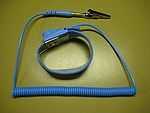28
10
Before opening a computer, I often hear advice to touch something that is "grounded" - a computer case for example, or a heating element - to avoid damaging the sensitive electronic equipment through static discharge.
What exactly is true here, and what are the do's and don'ts.
Touching what objects will actually work, and what won't? If I touch a computer case, does it matter what it stands on, and whether it is connected to an outlet? What other ways are there to protect the equipment from a static discharge than touching something grounded?
Are there common pieces of clothing that I shouldn't be wearing when working inside a computer, for example a woollen pullover?
There is a lot on Google, but there seem to be many contradictions and misconceptions out there, so I think this is a question worth having here.


1I touch anything metal, If I move around much, I touch metal again, lucky for me my workbench is part metal. – Moab – 2011-01-25T17:56:09.970
1
Related question: http://superuser.com/q/71326/36601
– AndrejaKo – 2011-01-25T19:04:46.7001If anyone doubts the seriousness of ESD, I've killed 2 mice and a PS2 controller with ESD, and I was just touching them through normal use. I'm always super cautious when I'm actually inside something. – Tofystedeth – 2011-01-25T22:54:12.357
1@Moab - surely touching something metal doesn't help that much unless that metal is grounded? These days, we're told absolutely never to leave the PC plugged in (but powered off) so the case itself is a suitable ground, the reason being that if the power supply is faulty you could be killed. Sounds odd to me - if that were the case, you'd probably be killed plugging in a USB lead, since all that back-of-the-PC stuff is bare metal. It's not so convenient, but working near a radiator works - so long as there's enough bare metal to touch. – Steve314 – 2011-01-26T15:02:52.383
@ Steve314, Surely I do it all the time, my desk is not "grounded" and I discharge on it all the time (I get shocked). Everything is grounded, its only a question of how well it is grounded, and when it comes to a high voltage static charge, it does not have to be as good of a ground as you think. – Moab – 2011-01-26T17:03:38.090
If you don't know that you house is wired right, buy a simple outlet tester at the hardware store, around 10USD. You plug it in and lights on it tells you if you're good to go or if there's a problem. Test every outlet. – None – 2011-01-31T15:25:49.893